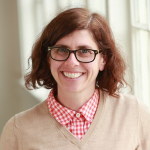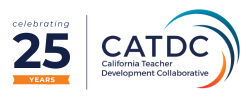Playing on the Same Team: Building a Bigger Community Across Schools

I recently visited a peer school in the Bay Area, a place where a few of CATDC’s Teaching Foundations “alumni” worked and a place where one of my colleagues was teaching a class for the first time. I thought it would be fun to do a site visit and see teachers in their element. I also knew that taking a day away from the busy demands of my job would require shifting a lot in my schedule, prioritizing one way of spending my time over another. While blocking out a day for site visits required me to reschedule and shift my calendar, I’m so glad I did it. I left my site visit more energized, inspired, and hopeful about the future of our young people. I had the privilege of spending my day rooting for my colleagues, and that moment solidified the cause I’ve committed to: the core belief that in this endeavor we call education, we’re all on the same team.
Forging Community from the Ashes of Isolation
When I first started working in independent schools, I felt part of a meaningful community, but quite separate from my neighboring schools. Within a 10-mile radius, there were at least half a dozen schools where I could have met and learned alongside colleagues, but because I was new to this universe, I didn’t know how to access anyone outside my own institution. And in fact, I was so busy and excited by co-building the school where I worked, I didn’t think I even had time to branch out.
When I started attending CATDC workshops over 10 years ago, I’d get excited by the people I’d met. We’d exchange email addresses and cell phone numbers; we’d talk about how we needed to stay in touch; and then days, months, years passed by.
Sometime about five years ago, around the same time I was becoming more fully vested in Teaching Foundations, a switch flipped: in order to sustain a career in independent schools, I needed a bigger community—made up of those who thought differently from me, who worked in places where the cultures were either deeply rooted or shifting, where people’s backgrounds and identities broadened my circle of friends and colleagues. And since then, I made a pact to radically commit to community beyond my school, and continue to foster relationships despite the time of year and challenges in front of me. In short, I was spreading the “same-team” gospel, ensuring all of us in schools (administrators, teachers, staff, parents) were working together towards the thoughtful education of young people.
Branching Out Across Sites
While it can be easy to get mired in the daily minutia of our work, it’s also healthy to branch out when or where we can. The following pieces of wisdom have helped me stay connected to colleagues across sites, and perhaps they can be beneficial if you seek a bigger community as well:
Give yourself weekly “project time”: whether you’re a classroom teacher, staff member, or school leader, every moment can invite a certain type of urgency. While at times there are urgent matters to attend to, this work isn’t sustainable unless we give ourselves some time back. Consider calendaring an hour a week for “project time.” During this time, commit to visiting a school close by, calling a colleague at a different site, and/or meeting a colleague for coffee/tea. My 90 minutes of weekly project time has allowed me to visit peer schools in my region and become a better leader because of the wisdom and support I receive from my peers across sites.
Make/keep one commitment and put it on the calendar: After leaving an awesome CATDC workshop and meeting your professional soulmate, make a commitment to exchange contact information and set a date to connect in a way that feels sustainable and doable. Perhaps commit to a text message that serves as brief check-in. Maybe y0u set some time for a walk. Or if you’re in one of CATDC’s ongoing programs, set some time before or after the session to meet. These types of commitments can provide the extra support you need to get through all the joys and challenges of the school year.
Visit one school site a year. This task requires some scheduling acrobatics, and it’s well worth it if you have the time. A lot of schools set aside professional days so we can visit one another, but sometimes, we have our own school needs to attend to. Consider reaching out to 3-4 schools you’re interested in learning more about and spend the day in classrooms or meeting with colleagues. Everyone can get quite busy, but if we take this leap to visit one another, or if we’re a host site and we open our doors to our colleagues, we increase the size and capacity of the team who supports our students.
Sign up for a CATDC event. The CATDC has a community as its foundation, and its program offerings have something for everyone. It’s an even bigger bonus if you reach out to a colleague at another site and sign up for a workshop together. It provides you opportunities to connect, and you can learn something new together.
Furthering the Work of the Beloved Community
Liza Raynal’s beautiful blog post, Educating as if We’re Already There, focuses on ways schools can help students to see the worthiness in themselves and others, and she makes reference to the Beloved Community that underscores Dr. Martin Luther King Jr.’s philosophy. As educators, we have an opportunity to further the work of this Beloved Community by supporting one another in the roles we play across sites, reaching out to connect when we can, and nurturing and empowering each other as we help our students learn and thrive.
 Lori Cohen has worked in education (both public and independent) for two decades and currently serves as the Dean of Faculty at the Bay School of San Francisco. Prior to her current role at Bay, Lori taught Humanities, Literature, and Religion/Philosophy courses; served as an Instructional Coach; and was the founder/coordinator of Bay’s Teaching Fellows program. This will be Lori’s sixth year as a co-facilitator/teacher leader in Teaching Foundations, a program that brings her joy and professional rejuvenation. In addition to facilitating professional development, teaching, and leading, Lori actively works towards equity and social justice in education, striving to offer access and pathways for all school stakeholders to thrive.
Lori Cohen has worked in education (both public and independent) for two decades and currently serves as the Dean of Faculty at the Bay School of San Francisco. Prior to her current role at Bay, Lori taught Humanities, Literature, and Religion/Philosophy courses; served as an Instructional Coach; and was the founder/coordinator of Bay’s Teaching Fellows program. This will be Lori’s sixth year as a co-facilitator/teacher leader in Teaching Foundations, a program that brings her joy and professional rejuvenation. In addition to facilitating professional development, teaching, and leading, Lori actively works towards equity and social justice in education, striving to offer access and pathways for all school stakeholders to thrive.
